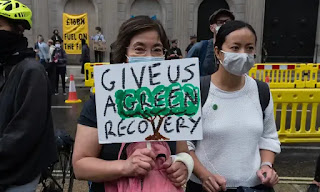Solving this conundrum requires much more than merely reducing the impact of high-consumption lifestyles. Similarly, if we focus on increasing efficiency this tends to increase resource use: make cars cheaper to run and people drive more. The core of any response that truly rises to this challenge will be interlocking policies that drive society on to an equitable and sustainable path.
Here are four policies that work together to maximise people’s welfare and freedoms, drive essential technological innovation, and allow society to operate within Earth’s limits. At their heart is human dignity coupled with breaking the dynamic of ever-greater production and consumption. Together they could quickly reorient the doomsday machine that is today’s global economy.
The first policy is universal basic income (UBI) whereby a financial payment is made to every citizen, unconditionally, at a level above their subsistence needs. UBI is needed to break the link between work and consumption. Critically, there is a constant awareness that we all need to be ever more productive at work, otherwise someone else will take our job. In response we have all said: I work hard, so I deserve that fancy meal, new gadget or long-haul holiday. Increased consumption is the reward for being ever more productive at work. Indeed, it makes little sense to curb our consumption when we know we will have to be ever more productive at work, regardless of our choices.
Fears that UBI may lead to laziness are unfounded: small-scale trials of UBI show people work hard and are typically more entrepreneurial. Crucially, those UBI recipients had lower anxiety, stress and health problems. UBI allows people to say no to undesirable work, unless it is well-paid enough. People can also say yes to opportunities that often lie out of reach, as they can study or retrain. And clearly there is an immense amount of work to do, from caring for others, to producing what we all need to live well. With UBI we would increasingly choose work that we thought mattered, rather than working ever harder to consume ever more.
The second policy framework is what I call universal shared services – others have argued for universal basic services, but what’s needed must be far beyond basic. Many countries have some of these, from healthcare to education. These are the services everyone needs and their delivery has society-wide effects. Core are health, education, energy, housing and leisure services. Providing these universally lowers financial costs due to economies of scale, and can substantially lower environmental costs. Such universal services make societies more equal and drive them towards more sustainability if two further policies are enacted.
The third policy tackles the climate emergency via legally binding ever-declining carbon budgets. This framework exists in the UK, following the 2008 Climate Change Act. The government must reduce UK carbon emissions to within a carbon budget. These five-year budgets decline to a zero allocation by 2050. This act also created an independent statutory body that analyses data and advises the government on how to achieve each successive carbon budget. The advice results in new legislation for specific sectors and drives technological innovation as the zero emissions long-term destination is clear. As a result the UK is world-leading in reducing carbon emissions.
The fourth policy uses the same declining budget principle, but tackles material use rather than energy generation. Similarly, declining “plastic use budgets” can set society on a pathway to eliminating plastic pollution. The same principle can tackle metal use to limit the damage from mining. A budget for the total amount of land used to produce the food a country consumes can limit the footprint of agriculture, central to halting biodiversity loss. As with carbon emissions, scientists can now track the production and use of plastic, metal and food. Scientific monitoring and new “declining budget” policies could keep material use within Earth’s limits.
These four policy goals together would drive people’s welfare up and our environmental impacts down. They are not new, nor are they very radical. We already, for example, assure incomes for pensioners in many countries, healthcare is universal in a number of countries, and declining carbon budgets are being used to help drive today’s energy transition.
But how to pay for it? The first response of the powerful to change is to argue that the costs are too great. They rarely are. After two decades of arguments about the high costs of tackling climate change, consultants to big business McKinsey now report that the cost of Europe reaching net zero emissions by 2050 is itself net zero. The investments literally pay for themselves. Revenue-raising options should also help to implement the four policies more cheaply; these could include taxes on rentiers financial transactions, and high energy or material use. Of course, without pressure from popular protest movements and political parties, nothing will change.
Yet systemic thinking on how to respond to global problems is increasing. The Covid-19 pandemic has produced a new seriousness by graphically revealing that there actually is no “outside” of society or the environment. When there’s no such thing as “outside”, the neoliberal mantra of avoiding taxes and regulations to keep wealth to yourself makes less and less sense. With political pressure and smart policies a new universality that breaks with centuries of exploiting people and the environment could be within reach. This is undoubtedly a very tough task, but we can’t afford to fail.


















